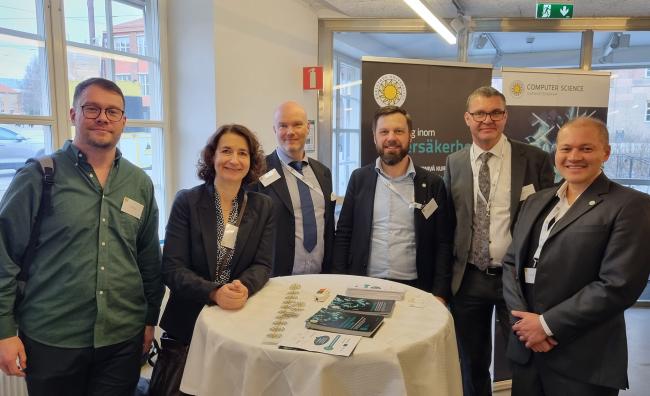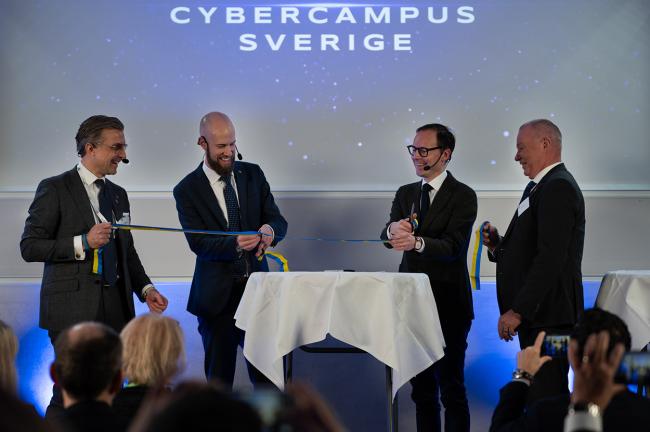CYBERCAMPUS SWEDEN HAS OPENED
2024-02-08The need for increased cyber security is growing day by day. As a response, the Swedish government is investing a total of SEK 100 million over the next few years in Cybercampus Sweden, which has now opened with an inauguration at KTH. The purpose behind the investment is to strengthen both skills supply and research in cyber security. The Minister for Education, Mats Persson, and the Minster for Civil Defence, Carl-Oskar Bohlin, were both present at the opening.
Simone Fischer-Hübner, Professor of Computer Science at Karlstad University, is part of the planning and project group for Cybercampus Sweden and has an active role in the new Swedish cyber security landscape.
– After a lot of planning and preparation, we are happy to announce that Cybercampus has officially started its operations. As part of our plans for the future, I will be assisting with the establishment of Cybercampus Sweden PhD Graduate School. This will be an important but also challenging task and I look forward to contributing in that regard, she says.
Cybercampus Sweden is a national initiative and a collaboration between universities, research institutes, government agencies and companies all over Sweden. Cybercampus Sweden aims to enable cutting-edge and agile research, innovation and education in cyber security and defence, beyond what is possible for individual organisations. The idea is for the initiative to meet needs that are not being addressed by any of the other actors in the field of cyber security and for the results to strengthen both society’s resilience and Sweden’s competitiveness.
David Olgart from KTH is the director of Cybercampus Sweden. He says that the opening of Cybercampus Sweden means that Sweden now has the same prerequisites to work with issues on cyber security as countries such as Switzerland, Germany and France have had in the past. Nations with the same needs for skills supply, research and innovation in the field of cyber security.
– Now we can make use of the results from the planning project, which has been crucial in order to draw on all the expert advice and opinions that were brought forward in workshops and meetings with stakeholders from all over Sweden, says David Olgart.
The recruitment of staff to establish the national educational and research environment of Cybercampus Sweden began straight from the start. Work on detailing the roadmap going forward, for example through workshops on education and joint research, is also underway.
WHAT ARE THE LONG-TERM PLANS?
– The current security situation in the world and recent cyber security incidents demonstrate the importance of having a meeting place of experts to address the complex challenges we are facing. It is necessary in order to contribute to a resilient and cyber-secure digitalised Sweden. Therefore, it is important to establish partnerships that ensure access to interdisciplinary expertise and resources from all over Sweden, says David Olgart.
The idea of a cybercampus has been around for a few of years and the initiative was originally presented by KTH, the research institute RISE and the Swedish Armed Forces. In 2022, a planning project to establish Cybercampus Sweden was launched with Karlstad University, the Swedish Civil Contingencies Agency (MSB), Ericsson and Saab as additional cyber security stakeholders.
FACTS: CYBERCAMPUS SWEDEN
- The aim is for Cybercampus Sweden to strengthen Sweden’s cyber security and the resilience of an increasingly digitalised, online society.
- The Swedish government is investing just over SEK 100 million in the development of the project over the next few years.
- Universities and organisations from the public and private sectors will collaborate and create an exchange of the government’s investment through ground-breaking and joint research, innovation and agile education.
- Cybercampus Sweden is also funded by Vinnova via the programme Avancerad digitalisering.
- The planning of Cybercampus Sweden was led by KTH, RISE, the Swedish Armed Forces, Karlstad University, Saab, Ericsson and MSB. More than 150 people from universities, companies and government agencies from all over Sweden participated in the planning.




